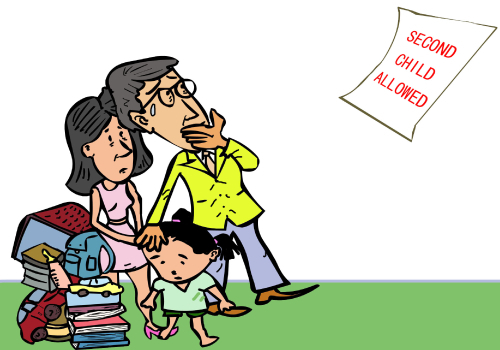 |
|
(LI SHIGONG) |
With the relaxation of China's family-planning policy, a growing number of couples are now allowed to have two children. However, most eligible couples are still not sure whether they wish to have a second child or not. The huge surge of babies that was predicted by many experts has failed to appear.
According to the National Health and Family Planning Commission, so far about 700,000 couples across the country have applied to have a second child in line with the new policy, but this number is almost 70 percent lower than expectations. All kinds of doubts and questions as to the efficiency of the new policy have arisen.
In December 2013, the Chinese Government decided to ease the country's decades-long family-planning policy, and allow couples to have two children if either parent is an only child in the family. The family-planning policy was first introduced in the late 1970s to rein in China's surging population. However, after more than three decades of strict implementation, this policy has resulted in problems. China's labor force decreased by over 3.4 million year on year in 2012, marking the first "absolute decrease." Meanwhile, the number of senior citizens is forecast to exceed one third of the population in 2050.
According to World Bank statistics, the fertility rate in China now stands at 1.6, compared to 2.1, the lowest rate required for a country's population to remain stable. If today's trend continues, China's fertility rate will only be 1.8 at most by 2050.
Despite the many merits a second child will bring to a family, many couples stick with one due to economic reasons. The lack of time to take good care of another newborn is also a source of hesitation.
A personal choice
Zhang Zhang (Guangzhou Daily): The change in the family-planning policy is expected to help relieve problems like the exploding aging population and balance the demographic structure. However, one year after the implementation of this new policy, the actual number of couples applying for a second child is much lower than expected.
Whether to have a second child is a big issue for most families. Even if a family decides to have one, a lot of preparations must be made. It's too early to say that the new policy has been met with coldness. Families that meet the requirements for a second child perhaps do not want to have one this year, but they might want to have one in the coming years.
In order to have a healthy baby, parents-to-be must first improve their own physical conditions to the best of their ability. They also need to save money for the coming of the child, as they have to pay for everything from diapers to kindergarten fees. Whether to have a second child is ultimately the business of the family, and the relaxed policy only offers permission.
Moreover, society is tolerant to diversified concepts and ways of living. In the old days, the Chinese believed that more children would bring more happiness and blessings, but due to social progress and changes in people's concepts, this belief is no longer dominant. When it comes to the second-child policy, some families think two children can help and support each other, while others believe that having one child is best for the family. Some families even decide not to have any children. All these ideas and practices are people's personal business and should be respected.
